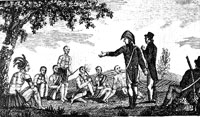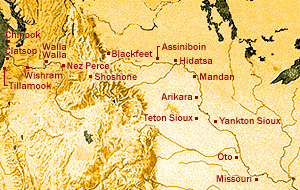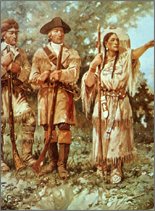|

|
| This is actually a drawing by Patrick Gass. |

|
| These are the locations of the Indian tribes met |

|
| Lewis, Clark, and Sacagawea |
Along the journey, as planned, Lewis and Clark came across quite
a few Indians. As signs of friendship the Indians were given friendship medals. The Indians told the Americans
useful information such as: where rivers and waterfalls were, and which plants and animals were edible. The Shoshone Leader,
Great Chief Cameahwait, met with them on August 17, 1805, and during the meeting gave them horses and advice for crossing
the Rock Mountains. In North Dakota during the winter of 1804 they met Cameahwait's sister, Sacagawea, who became their
guide and interpreter to the Shoshone people.
Among the group of Indians they met were ther plain tribes.
Included in these were the Mandan and Pawnees who lived in permanent villages most of the year, but still led a lifestyle
similar to their nomadic neighbors, and among this lifestyle was the hunting of buffalo. Other Indian tribes of this
group were the Osage, Sioux, Cheyenne, and Crow who were met by Lewis and Clark. These tribes were nomadic buffalo hunters
who lived out most of the year in tipis. The horse was an important part of their culture, as they needed to move all
over (being nomadic and all), and it was a necessity to hunting buffalo.
Another group of Indians was the Plateau Indains, whose territory
Lewis and Clark entered upon reaching the Rocky Mountains. Some of the tribes included in this group were the Blackfeet,
Shoshone, Nez Perce, Spokane, and Yakima, all of whom lived in Columbia River Country, and were fishermen, as well as hunters.
The last group of Indians was the northwest coast culture area
Indians. Lewis and Clatk met Indains of this group upon reaching the Pacific Ocean. Among this group were the
Clatsop, Tillamook, and Chinook tribes, all of which lived near the mouth of the Columbia River. These Indians were
excellent wood workers. They built large houses, boats, and totem poles.
|

